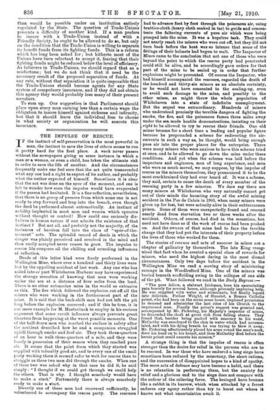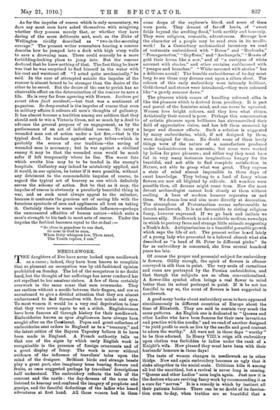THE IMPULSE OF RESCUE.
TF the instinct of self-preservation is the most powerful in man, the instinct to save the lives of others seems to run it pretty hard for the first place. A week never passes without the newspapers giving us some instance in which a man or a woman, or even a child, has taken the ultimate risk in order to save the life of another. And the circumstances frequently make one feel sure that the act quite transcended what any one had a right to expect of its author, and probably what the author expected of himself. Sometimes it is clear that the act was done on the spur of the moment, and one is left to wonder how soon the impulse would have evaporated if the person had hesitated. It is a fine reflection, nevertheless, that there is no group of persons from which some one is not ready to step forward and leap into the breach, even though the deed be performed almost automatically. An instinct of nobility implanted in most men and women which operates without thought or control! How could one seriously dis- 1.elieve in human nature if one admits the existence of that instinct ? But not all, and probably not the majority, of the instances of heroism fall into the class of "spur-of-the- moment" acts. The splendid record of deeds in which the danger was plainly perceived and revolved in the mind and then coolly accepted never ceases to grow. The impulse to rescue life conquers all the chilling and retarding influences of reflection.
Deeds of this latter kind were freely performed in the Wellington Mine, where over a hundred and thirty lives were ket by the appalling accident of last week. Any one who has sailed into or past Whitehaven Harbour may have experienced the strange sensation of knowing that men were working under the sea at a distance of four miles from the land. There is no other submarine mine in the world so extensive as this. The fire which followed the explosion cut off all the miners who were working in the furthermost part of the mine. It is said that the back-shift men had not left the pit long before the explosion occurred ; and if this be true, it is cue more example for M. Maeterlinck to employ in his curious argument that some occult influence always prevents great disasters from happening at the worst possible moments. One of the half-dozen men who reached the surface in safety after the accident described how he and a companion struggled uphill through smoke and foul air. They took three-quarters of an hour to walk three-quarters of a mile, and they were barely in possession of their senses when they reached pure air. It seems that the point from which they started was supplied with tolerably good air, and to every one of the small party working there it seemed safer to wait for rescue than to struggle as these two men did through the smoke. When one of these two was asked why in that case he did it, he said simply : "I thought if we could get through we could help the others. That is why. I thought somebody would have to make a start." Fortunately there is always somebody ready to make a start.
Directly one of these men had recovered sufficiently, he volunteered to accompany the rescue party. The rescuers had to advance foot by foot through the poisonous air, using brattice-cloth (heavy cloth soaked in tar) to guide and concen- trate the faltering currents of pure air which were being pumped into the mine. It was a hopeless task. They could not nearly reach the miners who were cut off, but they did not turn back before the heat was so intense that some of the fittings of their helmets had begun to melt. The Inspector of Mines came to the conclusion that not one of those who were beyond the point to which the rescue party bad penetrated could still be alive, and he accordingly gave orders for that part of the mine to be sealed up in order that further explosions might be prevented. Of course the Inspector, who had himself accompanied the rescuers, regarded the death of the hundred and thirty-six miners as an absolute certainty, or he would not have consented to the sealing-up, even to avoid such damage to the mine, and possibly to the other mines, as might throw the whole population of Whitehaven into a. state of indefinite unemployment. But the sequel was extraordinary. Hundreds of miners who understood precisely the terrible dangers of fighting the smoke, the fire, and the poisonous fumes three miles away under the sea made hostile demonstrations, insisting on their right to be allowed to try to rescue their friends. One old miner became for a short time a leading and popular figure because he propounded a scheme for redirecting the air- currents in such a way as, he thought, would bring enough pure air into the proper places for the enterprise. There were many miners who were anvious to have this scheme tried at once, and to be allowed to go down the mine under these conditions. And yet when the scheme was laid before the inspectors and engineers, men of long experience, and men who were as much moved, we may suppose, by the impulse of rescue as the miners themselves, they pronounced it to be the most crackbrained they had ever heard of. It was a scheme, they said, certain to cause the death of every member of the rescuing party in a few minutes. We dare say there are many miners at Whitehaven who very naturally cannot get out of their minds the haunting story of the awful mining accident in the Pas de Calais in 1906, when many miners were given up for lost, but were actually alive in their subterranean prison. Some of them were unexpectedly found and rescued nearly dead from starvation two or three weeks after the accident. Others, of course, had died in the meantime, but need not have done so if the work of rescue had been pushed on. And the owners of that mine had to face the terrible charge that they had put the interests of their property before the lives of those who worked for them.
The stories of rescues and acts of succour in mines are a chapter of gallantry by themselves. The late King recog- nised that fact when he created a special class of rewards for miners, who need the highest daring in the most dismal circumstances. Only two days before the accident in the Wellington Mine we read a moving story of ministering courage in the Vv'oodlesford Mine. One of the miners was buried beneath scaffolding owing to the collapse of one side of the pit. What followed we read in the Daily Express
" The poor fellow, a stalwart Irishman, bore his excruciating pain bravely for several hours, although piteously imploring help. He was supplied with water and stimulants, but finally lapsed into delirium. Father Wright, of Mu:islet, a Roman Catholic priest, who had been on the scene some hours, implored permission to descend and administer the last rites of his Church to the imprisoned man. Finally the priest's request was granted and, accompanied by Mr. Pickering, his Majesty's inspector of mines, he descended the shaft at great risk from falling stones. They found that, besides being packed with ma-cony to his waist, McCarthy was enveloped to the chin in water which had accumu- lated, and with his dying breath he was trying to blow it away. Mr. Pickering affectionately placed his arms round the man's neck, drew his head on to his breast, and thus McCarthy died before the heroic priest could execute his mission."
A strange thing is that the impulse of rescue is often stronger than the desire for relief in the persons who are to be rescued. In war those who have endured a long siege have sometimes been reduced by the monotony, the short rations, and the succession of disappointed hopes to a kind of apathy. The mere acts of defence may have become a habit, and there is no relaxation in performing them, but the anxiety for relief and a glorious end to the siege does not compare with the ardour of the relieving force. The besieged have become like a rabbit in its burrow, which when attacked by a ferret endures any agony rather than try to burst out where it knows not what uncertainties await it. As for the impulse of rescue which is only momentary, we dare say most men have asked themselves with misgiving whether they possess merely that, or whether they have daring of the more deliberate sort, such as the Duke of Wellington vividly described as " two-in-the-morning courage." The present writer remembers hearing a rescuer describe how he jumped into a dock with high steep walla to save a drowning man. There could scarcely be a more forbidding-looking place to jump into. But the rescuer declared that he knew nothing of that. The first thing he knew was that he was surprised to find himself in the water with his coat and waistcoat off. "I acted quite mechanically," he
said. In the case of attempted suicide the impulse of the rescuer is almost bound to he stronger than the desire of the other to be saved. But the desire of the one to perish has no observable effect on the determination of the rescuer to save a life. He is very far from agreeing with Horace. Invitum gui servat idem facit occidenti,—but that was a sentiment of
paganism. So deep-rooted is the impulse of rescue that even in military affairs it colours all men's thoughts of gallantry. It has almost become a tradition among our soldiers that they should seek to win a Victoria Cross, not so much by a deed to advance the general purpose of an engagement, as by the performance of an act of individual rescue. To carry a wounded man out of action under a hot fire,—that is the typical deed. In warfare against savage tribes—which is probably the source of our tradition—the saving of wounded men is necessary; but in war against a civilised enemy it may be that the wounded man would be much safer if left temporarily where he lies. The worst fate
which awaits him may be to be tended in the enemy's hospitals. Gallantry may indeed be mistakenly applied, and it would, in our opinion, be better if it were possible, without
any detriment to the commendable impulse of rescue, to regard the typical act of bravery as one which definitely serves the scheme of action. But be that as it may, the impulse of rescue is obviously a peculiarly beautiful thing in war, and as such must always appeal to the onlooker, because it contrasts the gracious act of saving life with the ferocious spectacle of men and appliances all bent on taking it. Certainly there is some undefinable influence—perhaps the unmeasured affinities of human nature—which suits a man's strength to his task in most acts of rescue. Under the impulse the feeblest becomes equal to the ordeal :-
" So close is grandeur to our dust,
So near is God to man, When Duty whispers low, Thou must, The Youth replies, I can."







































 Previous page
Previous page